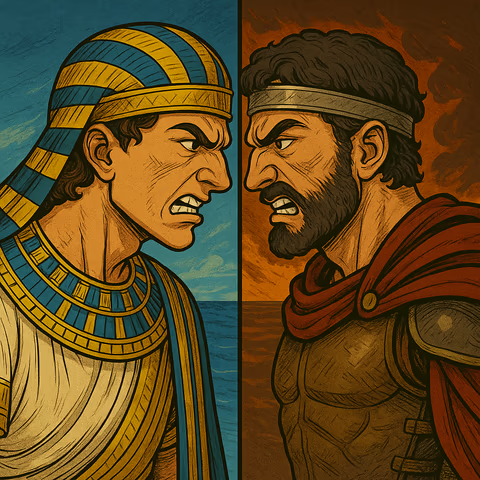
Differences in the Old Greek Version of Daniel (Chapter 11)
The Kings of the North and South
This chapter of the ‘Old Greek’ version of Daniel contains a large number of differences, 39 verses out of 45 differ from the Hebrew text.
Some people exaggerate these differences, claiming that it says opposite things to the Hebrew, but that’s not really true. Most differences don’t change the meaning at all, but actually cause the meaning to be more specific. Further, the Old Greek text is more historically accurate, at least according to the traditional interpretation.
That makes us suspect that some critics simply don’t like the fact that the Old Greek version does not support their preferred interpretation of this chapter (or the official interpretation of their church). Surely if the differences did support their preferred view, they’d be very pleased.
Some differences are just silly copyist errors, which we have identified and offered corrections for. Others are just rephrased idioms for the local audience, but some could well be caused by the ancient translator working from a damaged source manuscript, which we’ve also identified.
Most interestingly, a few differences may be preserved readings of an older, more original Hebrew text.
To summarise, our examination reveals that most of these differences are due to:
- Obvious copyist errors (in the centuries after the translation was made).
- The translator working from a damaged manuscript.
- The translator has updated idioms to ones more understandable to his audience.
We have explained and fixed the majority of these easily, giving us a very good text.
Once you account for those differences:
- The two versions are actually very similar.
- The Old Greek version contains some more historically accurate details.
- It gives us clues as to when the translation was made.
- It may reveal some older, more authentic readings from the original Hebrew version.
So while some might use this chapter as ‘evidence’ that the Old Greek is some hopelessly ‘flawed translation’ that can be dismissed, we argue that they have failed to examine the text thoroughly, and are making sweeping, uninformed assumptions. We see the differences in chapter 11 as yet more proof that the Old Greek text is extremely valuable, essential for textual criticism of Daniel, and a unique ‘lifeboat’ that preserves now long-lost readings.
Clearly about ancient times
The Old Greek version is clearly about the centuries leading up to and including the Maccabean Revolt, covering the 6th to 2nd centuries BC. The extra details and clarified language make it abundantly clear.
Therefore, either the Old Greek text was massaged to fit that interpretation, or the Hebrew text was later changed to fit some other interpretation.
One version was changed, and we strongly suspect that it was the Hebrew — for reasons we shall explain and for reasons covered in other chapters.
Contradicts some modern churches
Many modern religious groups interpret this chapter as pointing to modern times, as part of end times prophecies. However, since the Old Greek text is more specific to the 6th to 2nd centuries BC, it’s far more difficult to apply the prophecy to modern times.
Those groups interpretations rely heavily on the Hebrew text’s more ambiguous wording. Without that, it’s extremely hard to apply the prophecy to today’s world. The Old Greek version of the chapter is plainly about antiquity.
Differences
11:1
The Old Greek starts this chapter by repeating what’s at the start of chapter 10, that it’s still the 1st year of Cyrus. The Hebrew says it’s the 1st year of Darius.
The Hebrew version’s statement makes no sense, because at the start of this coversation (in 10:1) the Hebrew says it’s the 3rd year of Cyrus, and it’s suddenly the 1st year of Darius?! Not only is it bizarre for the year to change mid-conversation, but the order of the kings is backwards.
The Old Greek text, on the other hand, is entirely consistent, as chapters 10, 11, and 12 (which are all one conversation), all take place in the 1st year of Cyrus and there’s no problem.
11:2
The Old Greek says:
‘three kings have stood against Persia’,
But the Hebrew says:
‘three kings will arise in Persia’.
This is very likely a copyist error in the Greek because the Greek words can be easily changed to say this. It was introduced at some point over the centuries, when the Greek text was being copied by hand. We have corrected it in our translation.
See the translator note.
11:3
No important differences.
11:4
The Old Greek says that ‘he will teach others these things’, but the Hebrew says that his Empire will simply be ‘given to others’.
There’s no obvious way to be confused by the Hebrew. But the Greek ΔΙΔΑΞΕΙ ΤΑΥΤΑ (what it says now) could, perhaps, be confused with ΔΙΑΔΟΘΗΣΕΤΑΙ (‘will be given to others’), but only if that part of the manuscript was damaged or very worn, or missing entirely, at some point in the history of its copying.
So this is a possible copyist error in the Greek transmission, perhaps introduced centuries after its initial translation.
This is noted in a translator note.
11:5
The Old Greek calls the southern kingdom ‘Egypt’, but the Hebrew calls it ‘the king of the South’.
This is common throughout the Old Greek version.
11:6
The Old Greek is missing a key detail here. It does not mention the King of the South’s ‘daughter’ like it does in the Hebrew. It says much the same things, it just refers to all of these actions as that of ‘he’.
What the Hebrew calls ‘her,’ the Old Greek calls ‘his arm,’ meaning the king’s power. The traditional interpretation of this, that it refers to a temporary marriage alliance between the two kingdoms, is not affected by this difference.
11:7
The Old Greek speaks of the Northern King’s ‘strength,’ but the Hebrew calls it his ‘fortress/stronghold.’
The problem is that in these languages, a fortress or stronghold can also mean a person’s strength. It seems our Greek translator didn’t know if it was literally meaning a fortress or was just a poetic way of saying the king’s strength, so he chose to translate it as ‘strength.’
11:8 (i)
The Old Greek adds a small detail that in addition to plundering gold, etc., ‘their crowds’ will be taken to Egypt. The Hebrew does not mention this.
11:8 (ii)
The Old Greek is more specific in saying that the King of the North will have ‘a year’ of restbit before more attacks, but the Hebrew says ‘years.’
A small difference like that could easily be a copyist error, more likely one of ommission, meaning the Old Greek may be closer to the original Hebrew here.
11:9
The Old Greek adds the detail that the King of Egypt (the south) will invade ‘for some days.’ The Hebrew doesn’t specify this, just that he will invade.
We either have a loss in the Hebrew, or a translator flourish in the Old Greek. Either way, the difference isn’t very meaningful.
11:10
The Old Greek just ends by saying (literally) he will return and ‘he will be provoked against many.’ The Hebrew is slightly different, saying, literally, he will return ‘and stir up strife to his fortress.’
It’s not clear why this difference exists, as there’s no obvious way it could be a misreading of the Hebrew. Perhaps a copyist error in the Greek lost this extra comment about a fortress? Maybe.
However, if something specific did happen at a particular fortress, then it’s been lost to history.
11:11
No important differences.
11:12
The Old Greek says that the king will ‘disturb/trouble many,’ but the Hebrew says he’ll ‘cast down ten thousands.’
So one just says disturb, but the other implies killing.
We don’t know why it’s different; the two terms don’t look or sound similar in Hebrew, nor in Greek. Either the translator wrote how he understood it, or he worked from an older, now lost, version of the Hebrew. We don’t know which.
11:13
The Old Greek mentions that the regathered forces will be from ‘the city,’ but the Hebrew does not include this detail.
So the Old Greek either adds it, or it was lost from the Hebrew text later.
11:14 (i)
Two differences in this verse.
Firstly, the Old Greek again calls the southern kingdom ‘Egypt,’ but the Hebrew calls it ‘the king of the South.’
This is common throughout the Old Greek version.
11:14 (ii)
Next, the rest of the verse is quite different.
The Old Greek says:
‘He’ll try to rebuild your nation’s broken walls,’ (presumably referring to DaniEl’s people and JeruSalem) ‘and claim he’s fulfilling prophecy… But they’ll fail!’
The Hebrew could be talking about the same thing, but it’s using very different words:
‘…and sons of the violent ones of your people lift themselves up to establish the vision—and they have stumbled’.
Some scholars have suggested that the Hebrew text has been corrupted and the Greek preserves an older reading. You see, the Hebrew for ‘he will build’ (uvanah) could be mistaken for ‘and sons of’ (uv'ney), and also ‘breaches of’ (pirtzey) could be mistaken for ‘violent ones of’ (paritzey).
So if the Hebrew originaly read ‘and he will build the breaches of your people,’ then the Greek translator turned it into ‘he’ll try to rebuild your nation’s broken walls.’
The rest of the verse is pretty much the same.
11:15
The Old Greek says:
‘Then the Northern king will arrive and will turn his spears and capture the fortified city.’
The Hebrew says:
‘And the king of the north comes in, and pours out a mound, and has captured fortified cities’.
The Old Greek is missing the detail that the king of the north will ‘pour out a mound,’ which probably refers to a seige ramp.
Most people assume that the Old Greek translated from an older, lost, Hebrew text. However, the mount reference does appear in a Dead Sea Scrolls fragment of this verse. The rest of the verse has slight differences, but we think the overall meaning is the same.
Perhaps the Old Greek translator felt the detail about the mound would confuse his audience, so he changed it to a clearer military reference to spears. Alternatively, someone added the ‘mound’ detail to the Hebrew text. We don’t know.
11:16
The Old Greek just has the king ‘standing in the land,’ but the Hebrew text qualifies this by calling it the ‘the glorious land,’ which people generally understand to mean IsraEl.
Theodotion’s translation of the Hebrew says the same thing, ‘the land of Sabeir’ (a transliteration of the Hebrew for ‘glorious’). Further, a Dead Sea Scrolls fragment of this verse also includes the ‘glorious’ detail.
It’s not clear why the difference exists, but this means that the Old Greek version is not giving the game away and stating that the king will ‘stand’ in IsraEl.
Now, the king is usually interpreted to be Antiochus III, who did indeed defeat Egypt and take control of Judea/Israel from them (around 200 BC). He even visited JeruSalem after the battle, and incorporated the area into his empire.
Josephus wrote a lot about it and included many details. It’s beyond any doubt that the king did ‘stand’ in IsraEl. So perhaps the text the Old Greek is based on did not include this extra detail, and it was added later? We don’t know.
11:17 (i)
Three differences in this verse.
First: The Old Greek has some odd differences, such as referring to the king’s ‘work,’ which we translate as ‘his agenda.’ The Hebrew instead talks about ‘his kingdom.’
It could just be a misreading of the Hebrew, or that the Hebrew text had a copyist error, or that the Hebrew acquired a copyist error later, as the two terms look very similar:
- מלכותו (malkhuto) = his kingdom
- מלאכתו (melakhto) = his work
The trouble is that both terms work perfectly well in the context of the verse. A Dead Sea Scrolls fragment of this verse says ‘kingdom,’ but that doesn’t help us if this is a Hebrew copyist error that took place after the Greek translation was completed, but before the Dead Sea Scrolls were written.
So, which is the correct one? We don’t know, but the Old Greek is the oldest.
11:17 (ii)
Second: The Old Greek says the king will ‘make agreements’ with the other king, which actually clarifies the Hebrew, as the Hebrew word (wî·šā·rîm) is ambiguous, using a word which could mean a ‘treaty,’ but could also mean ‘upright ones.’
Given that many English Bibles translate it to say ‘upright ones,’ then the Old Greek is actually clarifying the Hebrew and suggesting that the modern translation is wrong, and it should be ‘treaty’ or ‘agreements.’
However, the 2nd century AD Theodotion translation of the Hebrew says ‘all things upright’.
A Dead Sea Scrolls fragment of this verse says ‘equitable conditions.’
So people have been confused by this for centuries!
11:17 (iii)
Third: The Old Greek talks about the ‘daughter of men,’ saying that she will ‘refuse to obey,’ whereas the Hebrew calls here ‘daughter of women’ and says she will ‘not stand.’
This is a small difference, but it’s interesting to note because the Old Greek is (yet again) much more specific and (yet again) more correct.
This part of the prophecy is generally understood to be referring to a little conspiracy that involved Cleopatra I. Her father tried to marry her off to the northern king so she would plot to undermine her new husband. However, she refused to do play along with this, so her father’s plan failed! Yes, it’s not that she failed (like it says in the Hebrew, that she didn’t stand), it was that her dad’s plan failed!
Interestingly, the Dead Sea Scrolls version of this verse agrees with the Old Greek in one point, but disagrees in another. Like the Old Greek, it calls her the ‘daughter of men,’ (not ‘daughter of women’) but it then agrees with the Hebrew text when it says she will ‘not stand’.
However, the Dead Sea Scrolls version strangely also speaks of corrupting him instead of her, which is actually more correct.
So even though we know exactly what this verse is about, it’s a bit messy.
11:18 (i)
Also three differences in this verse.
First, a little point. The Old Greek says that he’ll turn to ‘the sea and take many,’ but the Hebrew says he’ll turn to the ‘coastlands and take many.’
The meaning is likely the same, just that there was an idiom where the sea meant coastal settlements.
11:18 (ii)
The Old Greek simply states that ‘he’ will stop the reproach, but the Hebrew gives more details about who that is, saying it’s ‘a ruler’, using a word that can mean a commander, leader, or a magistrate.
Nobody knows why the Old Greek is missing this detail. Either the translator missed it, or it was lost from the Greek over time, or it was not in the Hebrew text he used (it was missing or added later).
Whatever happened, there was indeed a Roman figure (a consul) who may fit the bill here.
11:18 (iii)
The last clause of this verse is baffling in Hebrew, literally saying ‘without the reproach he shall turn back on him’, and nobody can figure out what the without bit means, so most translations just ignore it!
Yes, really.
But the Old Greek instead says something very different: an oath, which we translate as meaning ‘swearing an oath [to do so], paying them back equally’.
Now, that makes sense, but nobody can figure out why the difference exists between the versions.
To add to the confusion, the 2nd century AD Theodotion translation of the Hebrew says something different again: ‘But his reproach he will turn back on him’. It’s not clear which one is correct.
11:19
The verse is the same in both versions, except the first clause in the Old Greek says that he will return ‘to his homeland to strengthen his land’.
The Hebrew says he will return ‘to the fortresses of his own land’.
Considering the connection in the languages between strength and fortress, it’s possible that the Old Greek translator was giving us an interpretive translation; perhaps he thought that’s what returning to the fortresses meant, a way of saying that he would be strengthening his country.
After all, if an army starts defending a series of fortresses, they’re definitely strengthening that nation’s defenses.
11:20 (i)
This verse has three differences.
First, the Old Greek is much more specific at the start, where the Hebrew just says that someone else will stand up and take his position (another king will take over), the Old Greek says:
‘…from his root, [a] shoot of kingship will rise’.
That may sound strange to us in modern times, but it’s an expression that specifies that it’s one of the king’s offspring, ergo, his son (which is what happened).
It’s odd that the Hebrew doesn’t mention this, and the Greek does it in such a poetic way, too. Perhaps it was lost from the Hebrew text, or someone didn’t like it and replaced it with something more vague.
11:20 (ii)
Second, the Old Greek says that someone will:
‘…strike the king’s glory.’
This is entirely different in the Hebrew, which says (literally):
‘And there shall arise in his place one who imposes taxes on the glorious kingdom.’
It seems either the Greek translator misread it, or the Hebrew source had a copyist error (or a smudge, or a missing letter) in the text he worked from.
See the translator note for more.
11:20 (iii)
Finally, for this verse:
The Old Greek here is more accurate. It states that the king will be broken in his final days, but the Hebrew says he’ll be broken in a few days, implying a short reign.
The problem is that the king we believe it to be actually reigned for 12 years, which is not a short time for that era. This is likely because the Hebrew text has acquired a copyist error after the Greek translation was completed.
You see, in Hebrew lettering, the word ‘achadim (meaning ‘a few’) looks like ‘acharonim (meaning ‘last’):
- אֲחָדִים
- אַחֲרוֹנִים
It’s also very similar looking in the older Paleo-Hebrew script:
- 𐤀𐤇𐤃𐤉𐤌
- 𐤀𐤇𐤓𐤅𐤍𐤉𐤌
So it’s possible the Hebrew manuscript was later damaged (perhaps this word was at the end of a line, was damaged, so later copyists guessed what it was and got it wrong).
11:21 (i)
The Old Greek says this new king will come ‘suddenly,’ which actually clarifies the Hebrew word, which has a wide range of meaning and could also mean that, but can also mean ‘quietly.’
The Old Greek’s word choice is more accurate, as Antiochus IV did indeed come to power suddenly and unexpectedly.
11:21 (ii)
The Old Greek says the king will sieze the throne ‘in his inheritance,’ but the Hebrew says ‘by means of intrigue/scheming.’
The Hebrew is correct, because that’s exactly what happened.
The Old Greek seems to be a mistranslation from Hebrew here, where the translator didn’t understand a very rarely used word, and interpreted the root word incorrectly.
See the translator note for more.
11:22 (i)
The Old Greek seems to translate the metaphors used by the Hebrew into terms the Greek-speaking audience would understand.
So while the Hebrew talks about the king unleashing ‘a flood to sweep away’ his enemies, the Old Greek plainly says that he’ll ‘crush the shattered forces before him.’
This isn’t really a difference, it’s a good example of the work translators do to make the text understandable to their readers.
11:22 (ii)
The Hebrew includes an extra detail, that in addition to the enemy forces being broken:
‘…the leader/prince of the covenant’ will be broken too.
The Old Greek makes no mention of this at all.
Why would it be omitted? A mistake?
It’s also possible that the earlier Hebrew text our Greek translator worked from did not include it, and that it was added later. That could be true, but why would anyone add it?
The ancient Jews, at least by the 4th century AD, identified the ‘leader/prince of the covenant’ with High Priest Onias III, who was murdered in 164 BC in a high-profile series of events.
But, if that’s what Hebrew speakers thought it meant in more ancient times, why would someone then try to insert that event into the text? And why would they use such an odd expression for him, one not usually associated with the High Priest?
A simpler explanation is that our ancient Greek translator was working from a Hebrew scroll that had these words entirely missing or so badly damaged that it was unreadable.
So we have [inserted it] into our text, and added a translator note. However, we really don’t know if this extra wording is original or not.
11:23
The Old Greek says the king will act:
‘…against [a] strong people/nation by means of a small number of people.’
But the Hebrew says he’ll:
‘…become strong by means of a small number of people.’
It’s not clear why the difference exists, as there aren’t any similar-looking words that could be confused. So either this is an interpretative translation on behalf of the Greek translator, or the Hebrew text he worked from said something different.
If it’s interpretative, then today most people would largely agree with how the Greek translator phrases it, as King Antiochus IV did indeed gain power (against the majority) by means of a small number of allies.
11:24 (i)
The Old Greek that the king will:
‘…lay waste to a city.’
But the Hebrew describes it as:
‘…peaceably he’ll enter the richest parts of the province.’
Obviously, one describes a violent destruction of a city, while the other describes a peaceful entrance into some wealthy areas of a province. These are two very different things, and there are no known ways that this could be due to copyist errors or translation misunderstandings.
Either the Old Greek was deliberately translated differently, or it was changed at a later time, or the Greek translation is accurate, but the Hebrew text was deliberately changed at a later time.
We don’t know.
However, we should point out that the Old Greek version is more accurate, as King Antiochus IV did indeed lay waste to a city — Jerusalem! It’s one of the most famous events in the time period; Antiochus IV massacred people in JeruSalem, tore down parts of its walls, burned parts of the city, and even looted the Temple. It’s recorded in 1 Maccabees.
Indeed, once you know these events, the Hebrew version is rather strange, describing this horrific time in history but not including the violent attack on JeruSalem, but instead says that the king will enter the richest parts of the province peacefully!
11:24 (ii)
The Old Greek says that the king will:
‘…plot against the strong city, but his plans will come to nothing.’
But the Hebrew says he’ll:
‘…plot against the strongholds, but only for a time.’
This difference appears to be caused by a combination of misreading a plural Hebrew word as a singular (or working from a damaged scroll), which then causes a misunderstanding of the context.
See the translator note for details. This actually may be a clue as to when the Old Greek was translated.
11:25
The Old Greek text again calls the southern kingdom ‘Egypt’.
11:26 (i)
There are three mild differences in this verse.
The Old Greek mentions how the king’s:
‘…own worries (or ‘cares’) will consume and undermine (literally: turn back) him.’
In contrast, the Hebrew specifically says that:
‘Those who eat his delicacies will destroy him’.
This difference cannot be explained by visually misreading the Hebrew, nor by any copyist error in Hebrew or Greek transmission.
Most commentators believe that our Old Greek translator was working from a Hebrew text that said something different here, a more original and accurate reading. However, the difference is not a big one, as usually in war, one side is defeated by superior strength, not by internal issues!
Since both versions are referring to problems at home, the difference may be irrelevant, as the point is that the king is brought down by internal problems, not in war.
As for why the difference exists, we don’t know, but perhaps it’s caused by the Hebrew text being updated at a later time to include an idiom which means exactly the same thing, internal political problems, and therefore does not change the meaning.
11:26 (ii)
The Old Greek gives slightly more detail about the war, saying:
‘…they will pass by, he will drag [people] away.’
The Hebrew says:
‘…his army will be swept away.’
The difference may be explained by the fact that being ‘swept away’ is a common Hebrew idiom to mean being overwhelmed by a large military force, and the Old Greek translator may have been trying to say the same thing literally but also trying to make it understandable to his readers by adding a bit more text.
11:26 (iii)
At the end, the Old Greek says:
‘…and many will fall, wounded.’
The Hebrew says:
‘…and many will be slain.’
There’s a difference between being wounded versus being slain or killed. There’s a good chance that the Hebrew text acquired a copyist error, since both the Old Greek and Theodotion’s 2nd century translation both say wounded.
See the translator note for details.
11:27
The Old Greek says that two kings will:
‘…sit down to eat together at the same table’.
The Hebrew does not mention the eating, but instead says the two kings have:
‘hearts bent on evil’.
There’s no obvious way in which the Hebrew could have been misread or miscopied to add anything about eating or turning the words into words about their hearts being evil.
The most popular explanation is that our ancient translator was using an older lost Hebrew text.
However, we have another possible explanation…
Perhaps the Old Greek translator saw a damaged section of the text where words were illegible or missing, and so he guessed what it said, and ended up adding the details about eating.
Imagine it:
If the translator couldn’t read the words לְבָבָם לְמָרֵעַ (‘their hearts for evil’) but could clearly read the following phrase וְעַל־שֻׁלְחָן אֶחָד (‘and at one table’), he might reasonably infer that the missing text described some act bringing the kings to that table – namely, dining (δειπνήσουσιν).
This would create a smooth narrative flow. The second mention of eating in this verse complements this first one. This prompts the obvious question as to why the Old Greek translator couldn’t have found a better source document.
11:28-29
No important differences.
11:30 (i)
The Old Greek says that:
‘The Romans will come and they’ll drive him back.’
But the Hebrew says:
‘Ships from Chittim (or Kittim) will come against him.’
The reason for his change is that the term kittim changed in meaning over time.
At first, it meant a city in Cyprus, but eventually it came to mean all political powers to the west. When the Old Greek was translated, either the translator or later copyists decided to update this idiom, replacing it with what they understood it to mean — the Romans.
However, they should have replaced it with an equally ambiguous term, because it makes it sound like the book of Daniel named the Roman Empire centuries in advance, but it did not.
To learn more, see our translator note.
11:30 (ii)
The Old Greek says that:
‘…they’ll harshly rebuke him.’
But the Hebrew says:
‘…he shall be grieved.’
As you can see, one says what the Romans will do to him, but the other says how he’ll feel!
There’s no obvious way in which the Hebrew could have been misread here, or a way in which the Greek was miscopied. This could be an interpretative translation by the Greek translator, or later scribes updating/clarifying it, like they did with the ‘Romans’.
They may have felt that they were correctly interpreting the cause of being ‘grieved’, because the Romans really did rebuke Antiochus.
Alternatively, the Old Greek may be entirely correct and it was the Hebrew text that was changed at some point for some unknown reason. We don’t know.
11:30 (iii)
The Old Greek says that ‘they’ shall be enraged, but the Hebrew says, ‘he’ shall be enraged.
This is likely a simple copyist error in the Greek, as the ‘he’ and ‘they’ versions are very similar:
- ὀργισθήσεται = he shall be engraged
- ὀργισθήσονται = they shall be enraged
We correct it with an [insertion] and add a translator note.
11:30 (iv)
The final difference in this verse is quite great.
The Old Greek says that the king will:
‘…scheme against them, so they’ll end up abandoning the holy one’s sacred agreement.’
The Hebrew says that the king will:
‘…show regard for those who forsake the holy covenant.’
Either way, it’s talking about the same situation: the whole cause of the events recorded in the book of Maccabees. It’s just looking at it from a different perspective.
The Old Greek has him scheming against the Jews until they collaborate with him in Hellenizing the Jewish people, whereas the Hebrew talks of him scheming with Jews who are already sympathetic to his goal.
Both things happened.
There were already supporters of the king’s cause, but there were also those who were against him at first, but who gave in to pressure.
Why the two texts are worded differently is a mystery. Either the Old Greek translator worded it to say how he understood its interpretation (or later copyists did this), or the Hebrew text was later changed at some point. We simply don’t know.
11:31 (i)
The Old Greek has an interesting difference here.
Literally, it calls the temple ‘the holy thing of fear,’ whereas the Hebrew calls it ‘the fortress sanctuary.’
There isn’t any obvious misreading or copyist error here, so it’s probably just the translator (or later copyists) using an idiom common to his readers, rather than fortress sanctuary which may have been an unknown expression to them.
Good translation is about more than just accuracy, it’s also about making the text understandable to the reader. It seems like our Old Greek translator friend deftly replaced a foreign idiom with a local one. Good job!
11:31 (ii)
The Old Greek omits the word ‘daily’ when saying ‘the sacrifice’. This may be an accident, or it may just be because it was well understood by the translator’s audience and the word was not needed.
11:32 (i)
The Old Greek says that:
‘…they’ll corrupt [a] stubborn people.’
But the Hebrew says that:
‘…they’ll corrupt with a flattering lip.’
So one says who they will corrupt, and the other says how they will corrupt them. This may be an interpretative translation, as there’s no obvious way to misread the Hebrew or to make that with copyist errors. Alternatively, Hebrew copyists took offence over their people being called stubborn and changed it into a criticism of the king.
We don’t know.
11:32 (ii)
The Old Greek says that:
‘those who know these things will stand strong and take action.’
But the Hebrew says that:
‘the people who know their God will be strong and act.’
It seems that the Old Greek is saying those who understand this prophecy will be strong and act, but the Hebrew implies it’s those knowing their God.
This could be due to a misreading of the Hebrew text as the difference between ‘their God’ and ‘these’ is just two tiny letters (יו):
- אלהיו = their God
- אלה = these
Of course, our Greek translator friend may have read it correctly, and it was his Hebrew manuscript that was missing the letters, or may have been damaged.
Alternatively, the Hebrew text may have been changed by a copyist error later.
We don’t know, but this could be yet another difference in chapter 11 that’s possible to explain by our ancient friend working from a manuscript that was either damaged or had copyist errors. There’s a pattern! Whatever happened, it doesn’t really change much of the meaning.
11:33 (i)
The Old Greek says that the people will fall:
‘…by the sword and they will be worn out by it.’
But the Hebrew instead mentions they’ll fall:
‘…by the sword and flame.’
The Hebrew for flame and the Aramaic for weariness do look similar, especially if the text was smudged:
- להבה = flame
- ליהות = weariness
So if the text was smudged, it’s possible that the translator mixed up the two words if he also mixed up Aramaic and Hebrew. Since the two languages are very close to each other (and much of Daniel is written in Aramaic), it’s very possible that he did.
On the other hand, perhaps a later Hebrew copyist got confused in that exact way, changing ‘weariness’ to ‘flame’.
So we don’t know.
This information appears in a translator note.
11:33 (ii)
The Old Greek says that the people will be ‘stained/defiled’ from the captivity and plundering, but the Hebrew does not have this small addition.
This extra detail suggests the people will be morally harmed in addition to the physical harm. That did, indeed, happen.
Whether this was an embellishment added by the translator, or later Greek copyists, we do not know.
Alternatively, it may have been lost from later Hebrew copies either due to carelessness or because someone viewed it as embarrassing. All we know is that what it says is true, many were defiled by the events.
11:34
The Old Greek contains a portion that’s very confusing.
While the Hebrew says:
‘…but many will join them through deceit.’
Our Old Greek literally says:
‘…many will gather against them and against city, and many like by inheritance.’
If you think that doesn’t make much sense, you’re right — it doesn’t!
The last word of the verse (inheritance) is exactly the same as the word back in verse 21, where the Old Greek translator didn’t understand the rarely-used word, and so went back to the root, and then came up (wrongly) with ‘inheritance.’
It’s supposed to be something like deceit or intrigue or flattery.
So at least we can explain the last word.
The rest of the differences in this verse may be explained by the Hebrew text losing some words in copying. If that’s the case, then the Old Greek here is our only surviving record of the original. It probably originally read something like this:
‘…but many people of the city will join together against them through flattery/intrigue.’
See our translator note for a fuller explanation.
11:35
There’s a difference in how the verse starts.
In Old Greek, it says:
‘Some of those with understanding will think to purify themselves, to be selected and clean…’
However, the Hebrew talks of something a little different:
‘Those of understanding shall fall, [in order] to refine them and purify [them] and make [them] clean.’
So, on the one hand, the Old Greek has people seeing the situation and using it as a motivation to purify themselves, but in contrast, the Hebrew has some of these same people ‘falling’ as some kind of refining process, to weed out the bad ones.
There’s no discernable way in which this was misread or miscopied. So either the translator decided to seriously put his own spin on it, or later copyists changed either the Greek or the Hebrew text for some unknown reason.
Something weird is going on with this verse, because while the Theodotion 2nd century version says something similar to the Hebrew text, it’s not the same, being much shorter.
So what is going on here? We really don’t know.
Historically, what both versions describe happened. Several famous stories emerged, such as the mother with her seven sons who were all executed for refusing to give up the Jewish faith.
11:36 (i)
The Old Greek text says:
‘He’ll be enraged and lifted up above every god.’
But the Hebrew says:
‘He shall exalt and magnify himself above every god.’
Not only is there a difference between being angry and exalted, but one has it happening to him, while the other has him doing it to himself.
There’s no obvious way it was misread or miscopied. So again, we don’t know what happened. It’s either a very interpretative translation, later deliberate changes in either language for unknown reasons.
Both versions of the text accurately refer to events. King Antiochus IV certainly was enraged, he was well-known for his temper, especially in his attack on JeruSalem. Further, he even gave himself the title ‘God Manifest,’ so yes, he did indeed exalt himself and was exalted by others.
So whichever version of the verse is original, neither are wrong. At least we have that.
11:36 (ii)
The Old Greek ends the verse slightly differently, saying:
‘…his end will come.’
The Hebrew, though, adds:
‘…that which is determined shall be done.’
This certainly seems to be an interpretative translation, but that’s not too bad, as this is really a poetic idiom, and would perhaps not translate well into Greek literally.
11:37 (i)
The Old Greek uses the singular ‘desire of woman’ instead of ‘the desire of women.’
(Note that the grammar is ambigious in both languages; it could mean a man’s desire for a woman/women, or the desires that a woman/women posses in themselves.)
The discrepency between singular and plural couldn’t be a misreading of the Hebrew, nor an accidental copyist error, because the two words are completely different (due to a quirk of the Hebrew language, the singular and plural come from different roots).
So the difference is deliberate. Either the Greek was changed or the Hebrew was changed.
However, note that woman/women can also mean wife/wives.
If we read the Old Greek as saying ‘wife’, we could consider that it’s referring to the desire of King Antiocus IV’s wife. And that would make sense. You see, she no doubt desired that her own son (from a previous marriage) would succeed the throne. But, her husband Antiochus IV didn’t want that, so had the young man killed. These are well-known notorious historical events.
See our translator note for more.
11:37 (ii)
The Old Greek adds a detail not found in the Hebrew. It says:
‘…and mighty nations will be subjected to him.’
It’s not clear whether this was added to the Old Greek, or whether it was lost from the Hebrew.
We can speculate, though.
It’s seems like a bit of an overstatement that ‘mighty nations’ came under Antiochus IV’s control. Sure, he did have some temporary wins, most famously over Egypt, but that’s all — temporary wins.
He also subjugated Armenia.
But that’s really it.
So perhaps this is a later addition to the Old Greek text, perhaps even a marginal note that got interpolated into the text.
We have added a translator note to explain this to readers.
11:38
The Old Greek just says that:
‘He will move from his position.’
Whatever that means.
It’s radically different from the words in Hebrew, which say:
‘Instead of them, he will honor a god of fortresses.’
However, confounding the issue is that Theodotion’s 2nd century translation into Greek says:
‘In place of him, he’ll glorify the god Maozin.’
It seems that Theodotion interpreted the Hebrew word for ‘fortresses’ as a proper noun for a false god! Yet there’s nothing unusual about the spelling the word in the Hebrew text we have today, so there’s no obvious reason why he would interpret it that way.
Besides, there is no known god called Maozin, not in any Greek, Egyptian, Canaanite, Syrian, or Mesopotamian pantheon.
It’s all very confusing.
What’s even more strange is that King Antiochus IV famously promoted the Greek god Zeus, not a war god like Ares. So in that sense, the Old Greek text is (yet again) more historically accurate.
Interpreters of the Hebrew text have a difficulty in explaining the Hebrew version here, because there’s simply no evidence that it happened, and they often resort to arguing that Antiochus tried to promote certain militaristic aspects of Zeus, but again, although that is possible, we currently don’t have any evidence for it.
So whatever the Old Greek version means here (‘he will move from his position’), it is, at least, not historically inaccurate.
11:39 (i)
The Old Greek says that:
‘…he’ll act [against] cities and enter a strong fortress,’
But the Hebrew doesn’t mention the cities, but says:
‘…he’ll act against the strongest fortresses.’
It’s not clear why these differences exist. Perhaps it’s because there’s some overlap between a city and a fortress, as in ancient times, these were often the same thing.
However, that doesn’t explain why the Old Greek sounds much more specific, sounding like many cities will be attacked, but then there’ll be something special about a particular fortress.
The temple in JeruSalem was often considered a strong fortress, and it was the one that Antiochus IV attacked. So perhaps this is part of a more interpretative translation by our Greek translator, emphasising Antiochus’ entry into the temple.
However, it’s also possible that the Hebrew text was later changed. We don’t know.
11:39 (ii)
The Old Greek says that:
‘…he’ll divide up land as gifts.’
But the Hebrew more explicitly says he’ll give out land as a ‘reward,’ or perhaps, ‘sell it off for a price.’
This is probably an interpretative translation by the Greek translator, with the translator telling us how he interprets the Hebrew. Since people tend not to give gifts of land and power to their enemies, it’s only logical that gifts would be given to friends and supporters, often as rewards.
So is this really a difference? Not especially.
Most famously, Antiochus IV sold off the office of the High Priesthood, which included temple lands and its tithing revenue. In addition, it’s likely that he sold other lands or issued them out as rewards, since that was standard practice anyway.
It may be mentioned in the prophecy because he also did it in Judea, which is a shocking thing to do, because under the Mosaic Law, the Jews had ancestoral land rights. Even though this (and the jubliee system of returning land ownership every 50 years) was not always possible to practice due to foreign domination, it’s still shocking to the Jews because it’s supposed to be God’s land to divide up, not some foreign king’s land to give away!
So our Greek translator may have simply been emphasising that shocking point, and assumed the reader would understand the context.
11:40
The Old Greek says that he’ll ‘invade Egypt’, but the Hebrew is a little different and does not name Egypt. Instead, it says he’ll invade lands (plural), then adds that he shall ‘overwhelm [them] and pass through [them].’
The Old Greek text consistently names Egypt throughout chapter 11. Could this be because the prophecy originally said that and the Hebrew was later changed, or is this part of an interpretative translation?
We don’t know. Nobody can say for sure.
As for the additional clause in the Hebrew, either that was added later or it was missed in the Greek translation. Again, we don’t know.
However, what we do know, is that Antiochus IV did indeed invade Egypt and marched through Judea and Phoenicia on his way there. So both versions are historically accurate, but the Old Greek is more specific.
11:41
The Old Greek says that:
‘…he’ll come into my land.’
But the Hebrew says that:
‘…he’ll enter the glorious land.’
Here the man in linen refers to Israel as ‘my land’, which is interesting. It’s not clear why this difference happened, it’s probably not a scribal error or misreading. So it’s either an interpretative translation, or the Hebrew was changed at a later time.
We don’t know.
11:42-43
No important differences.
11:44
The Old Greek adds the detail that the northern king will head out with a sword.
This is likely just a stylistic choice of the translator, used because the Hebrew words are particularly strong verbs, implying total annihilation.
11:45 (i)
The Old Greek just says the king will pitch his ‘tent’, which is a perfectly fine translation of the Hebrew word, but the Hebrew text actually uses a persian loanword!
It’s appadno, probably from the Old Persion apadana, which specifically means a royal pavilion tent, like a tent acting as an audience hall for meeting a king.
So yes, ‘tent’ is a perfectly good translation, but an important detail is lost in our Old Greek text.
11:45 (ii)
The Old Greek says the ‘tent’ will be pitched:
‘…at the holy mountain of desire’.
The Hebrew instead says it will be pitched:
‘…at the holy mountain of glory’.
This could just be a translation choice, where our translator friend used a more familiar idiom, assuming he understood it to be referring to the temple on mount Zion. There’s no obvious misreading of the Hebrew or Hebrew copyist error, nor is there any obvious Greek copyist error.
Contents
 Introduction to
Introduction to
Differences in Daniel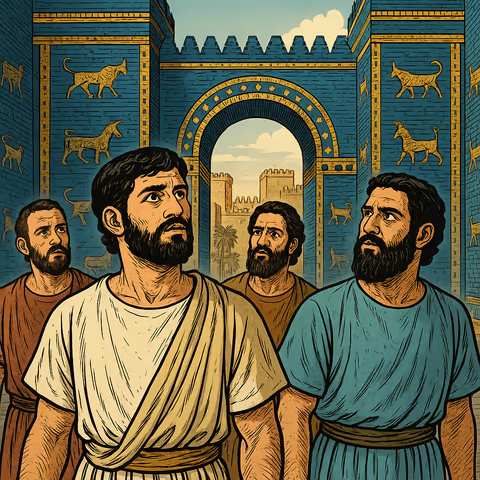 Differences
Differences
in Chapter One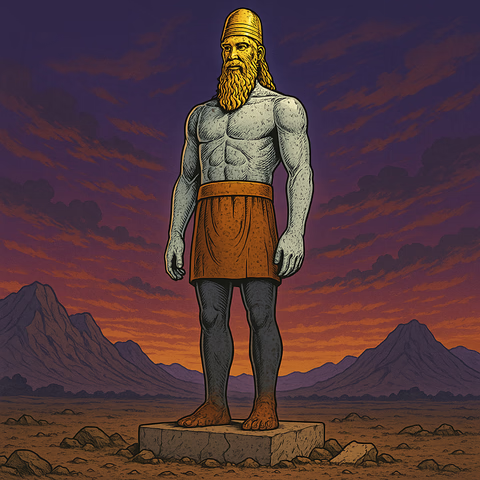 Differences
Differences
in Chapter Two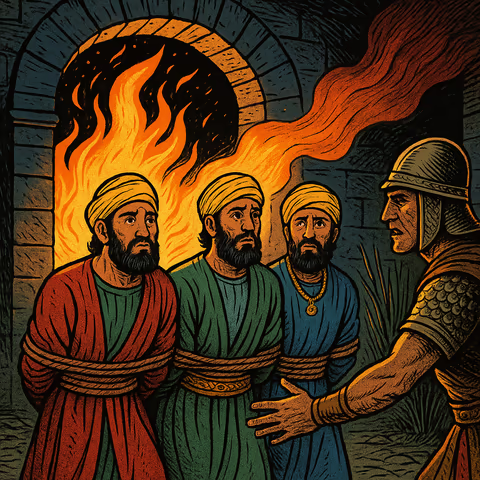 Differences in
Differences in
Chapter Three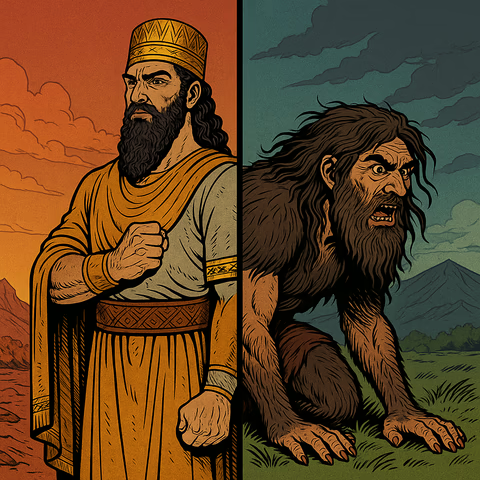 Differences
Differences
in Chapter Four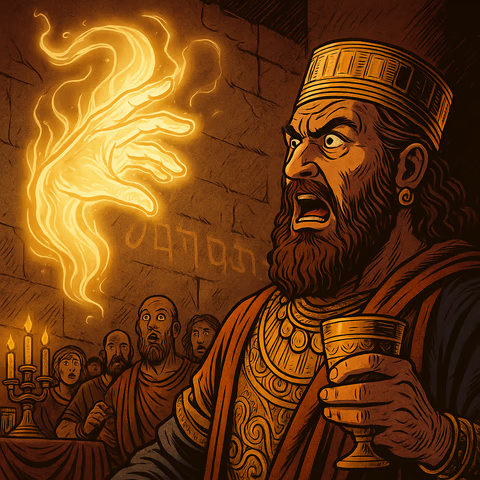 Differences
Differences
in Chapter Five Differences
Differences
in Chapter Six Differences in
Differences in
Chapter Seven Differences in
Differences in
Chapter Eight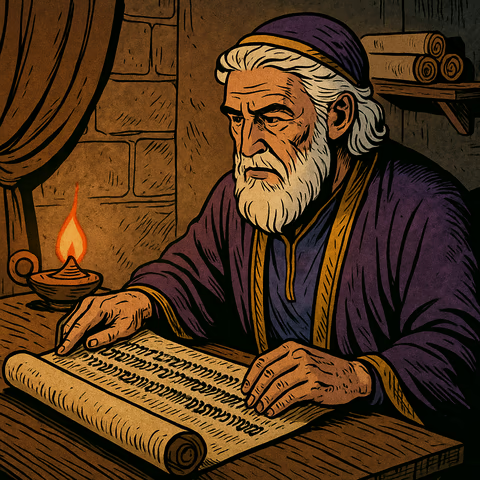 Differences
Differences
in Chapter Nine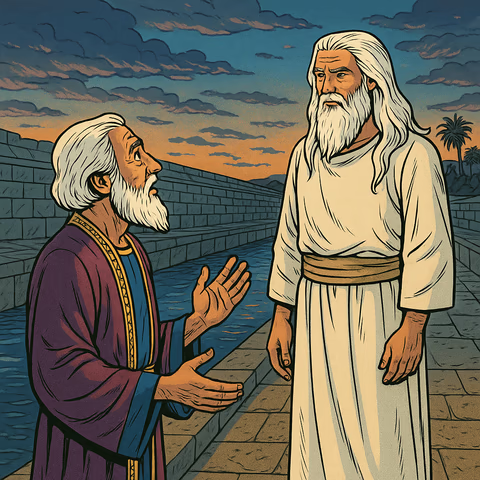 Differences
Differences
in Chapter Ten Differences in Chapter Eleven
Differences in Chapter Eleven Differences in
Differences in
Chapter Twelve